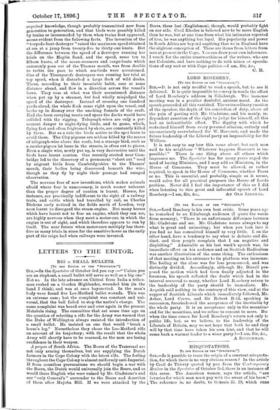LETTERS TO THE EDITOR.
BIG v. SMALL BULLETS.
[To THE EDITOR OF THE "SPECTATOR"] Sue, —In the Spectator of October 3rd you say :—" Unless you are an elephant, a small bullet will serve as well as a big one." Not so. In the late advance on Chitral from India a tribes- man rushed on a Gordon Highlander, wounded him (in the hand I think), and was at once bayonetted. In the man's body were found five Lee-Metford bullet wounds. This was an extreme case ; but the complaint was constant and uni- versal, that the ball failed to stop the native's charge. The same complaint was heard over and over again in the present Matabele rising. The committee that sat some time ago on the question of selecting a rifle for the Army was warned that the Duke of Wellington always resisted the introduction of a small bullet. He insisted on one that would "break a horse's leg." Nevertheless they chose the Lee-lietford rifle on account of its trajectory ; with the result that the whole Army will shortly have to be rearmed, as the men are losing -confidence in their weapon.
A propos of South Africa. The Boers of the Transvaal are not only arming themselves, but are supplying the Dutch farmers in the Cape Colony with the latest rifle. The feeling throughout the Cape Colony is almost uniformly anti-Imperial. If from countless provocations we should begin a war with the Boers, the Dutch would universally join the Boers, and so would those English who were rained by Mr. Gladstone's and our "only General's" surrender to the Boers and desertion of them after Majuba Hill. If we were attacked by the
Boers, these last (Englishmen), though, would probably fight on our side. Cecil Rhodes is believed now to be more English than he was, but at one time from what his intimates reported of him, he was anything but loyal. His popularity and power in South Africa are beyond anything that we in England have the slightest conception of. These are items from letters from men at present in the Cape. You can draw your own inferences. I vouch for the entire trustworthiness of the writers, who are not Colonists, and have nothing to do with mines or specula- tions of any sort or with Cape politics.—I am, Sir, &c.,
C. M.






































 Previous page
Previous page